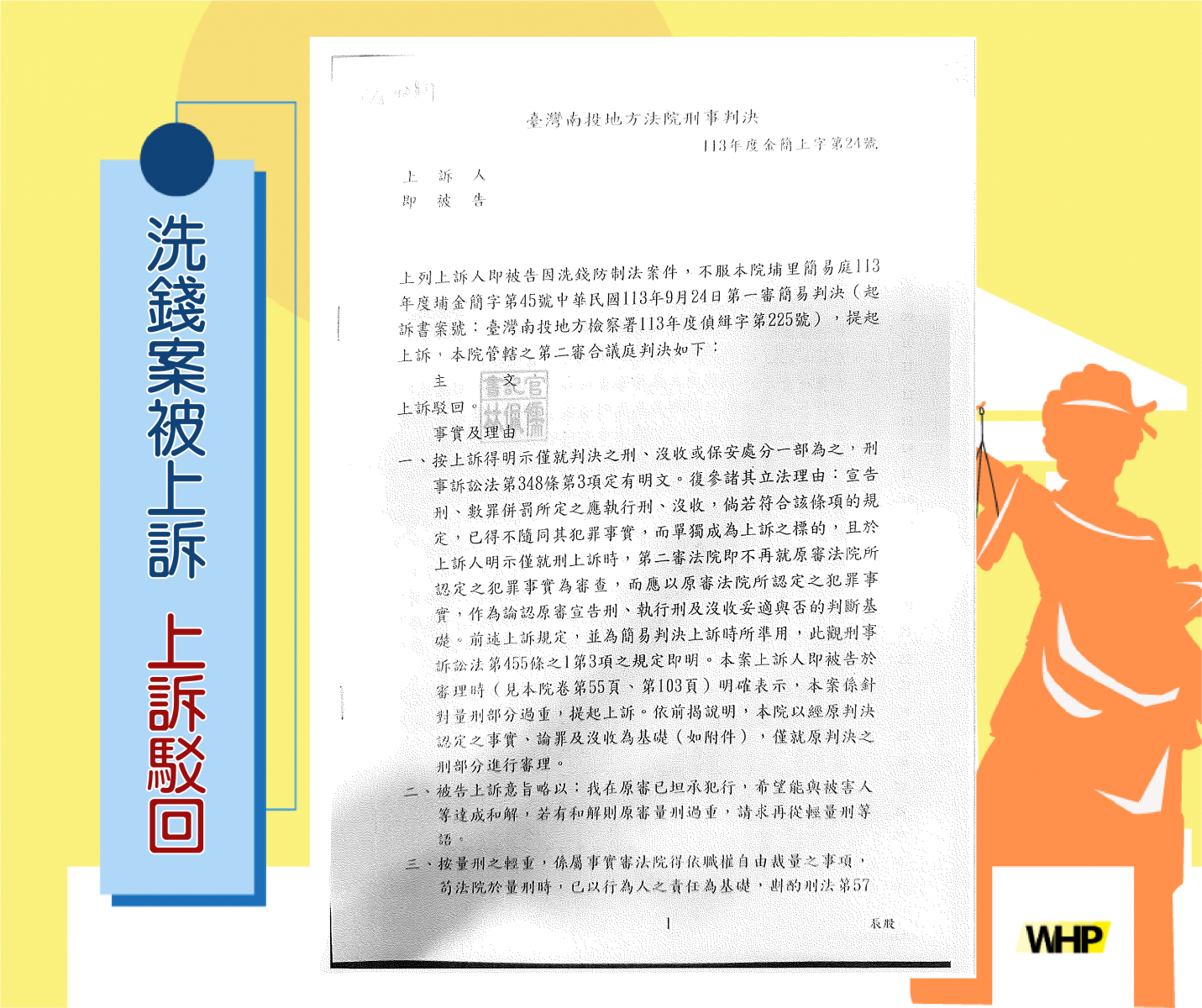首頁 > Case Studies
Case Studies | Criminal Second Instance | Report of Winning a Lawsuit for Violating Anti-Money Laundering

Relevant Legal Provisions
Article 30 of the Criminal Code: Anyone who assists another person in committing a criminal act is considered an accomplice. Even if the other person is unaware of the assistance, it is the same.
Article 339 of the Criminal Code: Anyone who uses fraud to make a person transfer property to themselves or a third party with the intent of unlawfully obtaining it for themselves or a third party shall be sentenced to imprisonment for up to five years, detention, or a fine of up to 500,000 NTD, or both.
Article 14 of the Anti-Money Laundering Act (before amendment): Anyone who engages in money laundering behaviors listed in Article 2 shall be sentenced to imprisonment for up to seven years, and may be fined up to 5 million NTD. Attempts to commit the aforementioned crimes shall also be punished. In the two preceding cases, the penalty shall not exceed the maximum penalty prescribed for the specific crime.
Facts and Reasons
The defendant had previous related cases but, despite knowing that their personal financial account was being used by others, which could easily be exploited as a tool for crimes related to property, still disregarded the potential harm others might suffer from property damage. The defendant submitted relevant withdrawal cards and account information to a fraud group. The case was reported by the complainant (i.e., our client). The first-instance judgment resulted in a sentence of five months of imprisonment, along with a fine of 60,000 NTD. If the fine was not paid, the defendant would be required to serve labor in lieu, with each day of labor being calculated as equivalent to 1,000 NTD.
Judgment
The appeal was dismissed.
The defendant's appeal was based on the argument that the original trial had already admitted to the offense and hoped to reach a settlement with the victim. If a settlement were reached, the defendant argued that the sentence was too severe and requested a lighter sentence. However, the original trial had already considered the defendant’s failure to reach a settlement with the victim and to compensate for the damage caused to the victim. While the defendant claimed in the appeal that they were willing to settle with the victim, no settlement had been reached with the victim by the time of the final arguments in this court. Therefore, the situation remained unchanged compared to the original trial. The court found that the original trial's sentence had taken into account the circumstances of the defendant’s crime, including all sentencing factors under Article 57 of the Criminal Code, and had properly considered the statutory sentencing range. There was no apparent legal error in the sentencing, nor was the sentence excessively harsh or unduly lenient. Therefore, the court concluded that the defendant’s appeal regarding the severity of the original trial’s sentence was groundless and dismissed the appeal.
(Note: To protect the client's interests, certain case details and judgment images have been redacted and modified. For a full review of the case, please refer to the Judicial Yuan's judgment database)
Attorneys:Ian Yan
-
03.25 2025Case Studies
Successful acquittal of lawyer's dummy account def...
-
03.18 2025Case Studies
Divorce | Claim for Distribution of Remaining Prop...
-
03.11 2025Case Studies
Criminal Second Instance | Report of Winning a Law...
-
02.25 2025Case Studies
Civil | Second-instance case of demolition and lan...
-
02.18 2025Case Studies
Car Accident | Volunteer Traffic Officer Hit by Ca...
-
02.11 2025Case Studies
Car Accident | Our Lawyer Successfully Assisted th...
-
02.04 2025Case Studies
Traffic Accident | Lawsuit for Serious Injury Succ...
-
01.21 2025Case Studies
Fraud | Dummy Account Defendant Successfully Obtai...
-
01.14 2025Case Studies
Criminal and Civil | Our Lawyer Successfully Helpe...
-
01.07 2025Case Studies
Obstruction of Sexual Autonomy | Accused of Taking...
-
12.31 2024Case Studies
Civil Case | Claim for Compensation Adjustment, Vi...
-
12.24 2024Case Studies
Defamation | Uploading Photos to a Gossip Forum Le...
-
12.17 2024Case Studies
Civil Case | False Claims in Assignment of Debt: V...
-
12.10 2024Case Studies
Sexual Harassment | Defendant Not Prosecuted for S...
-
12.03 2024Case Studies
Breach of Trust | Defendant Successfully Acquitted...